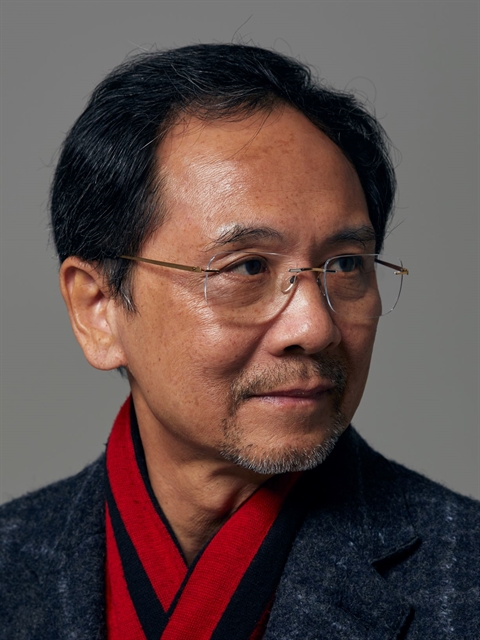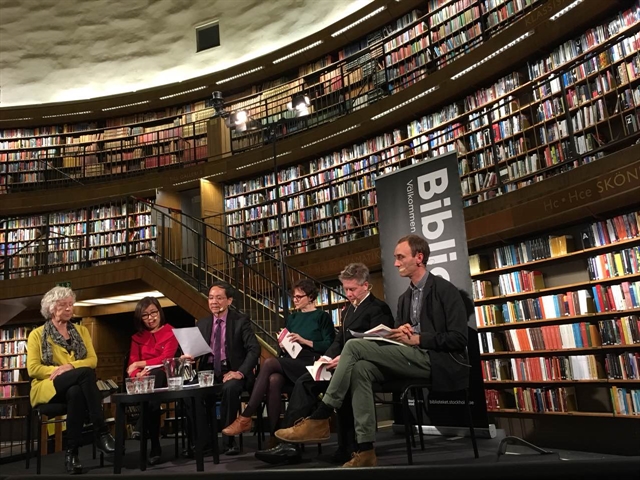 Life & Style
Life & Style

Lê Hương chats with popular writer Mai Văn Phấn, who has won four international prizes this year.
Lê Hương chats with celebrated poet Mai Văn Phấn, who has won four international prizes this year.

|
| Poet Mai Văn Phấn. Photo courtesy of the poet |
You recently won poetry awards at annual festivals in Macedonia and Russia. Could you tell us more about the events and what led you to these honours?
The organising boards of the Aco Karamanov in North Macedonia and the Literature Awards in Russia invited me to submit works to the events.
The “Aco Karamanov Poetry Meetings” takes the name of Macedonian poet and partisan Aco Karamanov (1927-1944), who is considered one the founders of Macedonian contemporary literature. He was also a great patriot, fighting against German facism in the Second World War. Every year his hometown of Radovis holds a poetry festival in his honour.
The first event was organised in 1967. In more recent years, the event has been co-organised by the Ministry of Culture of the Republic of North Macedonia, the municipality of Radovis, and the Aco Karamano-Radovis Cultural Centre.
Each year, the festival chooses a distinguished writer to publish a book. Last year, Spanish poet Justo Jorge Padron gained the honour. This year, the organisers invited 30 poets from all over the world to submit their works. Raed Anis Al-Yishi from Saudi Arabia and I won this year. Raed Anis Al-Yishi’s book is titled Buffled Gunpowder and mine is titled New Year Bath.
The Golden Pen Russian National Literature Award was established in 2004 by communications expert Alexander Nikolaevich Bukharov and philosopher and writer Svetlana Vasilievna Savitskaya under the care of the Russian Writers Association and sponsored by some social organisations. The award is for Russian and international writers, who have had their works translated into Russian.
This year, the board received works in various genres including poetry, prose, drama and music between January 1 and September 15.
The jury gathered prestigious writers, culturists and artists including Lev Anninsky, Mikhail Nozhkin, Rimma Kazakova, Evgenia Evtushenko and Mikhail Zadornov, who chose 1,000 works from 72 nations as nominees for gold and silver prizes and certificates.
I won the Russian Silver Pen Award 2020 with my epic Thời Tái Chế (Era of Junk). Translator Anna Popova, who translated this work into Russian, received a prize from the World Writers Union.
This year you have won four international prizes. How did you do it?
The other two prizes were The Literary Award from the Association of Literary Translators of Montenegro, and First Prize at The International Creative Meeting and Festival “Together in the XXI Century” in Bulgaria. I submitted my works online to the events.
What did the juries say about your works?
The jury at the Aco Karamanov Poetry Meetings said: “Mai Văn Phấn nurtures a specific lyrical expression that is deeply rooted in the Vietnamese spiritual tradition. His poetic expression is in perfect harmony with the identification with nature and his unobtrusive silent song that overwhelms us with contemplative philosophical discourse and surprises with its simplicity that suddenly becomes a lavish reflection of reality as in the verse.”
In Russia, Galina Umyvakina, chairperson of the Writers Association in Voronezh, noted: “Mai Văn Phấn is an understanding poet, who accept current life as an incarnation of time.
"Throughout his epic, there are two main flows of ideas in unity: firstly, bleeding, crippled unconsciousness, and martyrdom; and secondly, survival, remembrance of kinship, fraternal spiritual and spiritual 'donation'.
"Blood is not just a symbol of the tragic ordeals of the ethnicity. This is a multi-valued image that has grown from the centuries-old outlook of the Eastern philosophical and cultural world."
This year has been difficult in many fields across the society like economics, tourism, services and import-export. Is this true for literature?
I think literary activities do not follow the course of economics, politics and society in general. In some specific situations, literature can be considered as valuable as “men in war” and “women in peace” as mentioned in Vietnamese sayings.
Distinguished works are always made by the talent and fate of each writer. History has witnessed great works born from upheaval.
Please tell use about your recent work and what you plan to share with the world.
I’m still working diligently in silence. Composing poetry and writing critiques are my passions. I also spend time exchanging with foreign translators who have translated my poems into other languages. My poems have been translated into 33 languages. I have 23 books of poetry in some countries. My latest ones were just published in India and South Korea.
My book titled And Flew Away Heart, translated by Indian poet Neetta Porwal from English to Hindi, gathers 405 short poems and was published by Notion Press Publishers in October.
Era of Junk translated by Prof Ahn Kyong-hwan from Vietnamese into Korean was released by Dohun Publishers in August.

|
| Poet Phấn (third from left) recites a poem at a library in Stockholm, Sweden in October 2018. Photo courtesy of the poet |
What is your advice for young people who like poetry and want to start composing?
If you've just discovered poetry, please listen to your heart and let your feelings lead you. You should reach your own poetic world; i.e. the door of that world should really open to you, allure, hypnotise you.
When you define what creation is, you should equip yourself general literary knowledge and poetry trends in Việt Nam and throughout the history of the world. You should enrich your life experience and nurture your feelings.
You should define where you and Vietnamese literature are, what needs to be done and how you should do it. Then you can become a real author and take your career further. VNS